“Data is more valuable than oil.” True words spoken by Swish Goswami, my guest on today’s episode. At the age of 23, Swish is the CEO & Founder of Trufan, a LinkedIn Youth Editor, a three-time TEDx speaker, and a United Nations Youth Ambassador. Trufan is a social intelligence platform that helps brands of all sizes make smarter marketing decisions using data. They’ve so far made two acquisitions, raised over $4.1M to date (from several NBA players and venture firms) and have clients like Samsung, Netflix, NBA, NFL, and PUMA.
In today’s episode, we discuss the future of marketing, which Swish sees as less about advertising and more about community building. Once you have retained the business of small and medium enterprises, we talk about how you hang on to that business. Swish explains the intricacies of Trufan, and how they activate grassroots communities made up of super fans and micro-influencers. He breaks down NFTs (non fungible tokens), different platforms and social media sites, and how a brand can create trust, personalize a user’s experience, and not take itself too seriously. If anyone understands the motivations of gen Z influencers and consumers it’s Swish, so get ready for a must-listen episode!
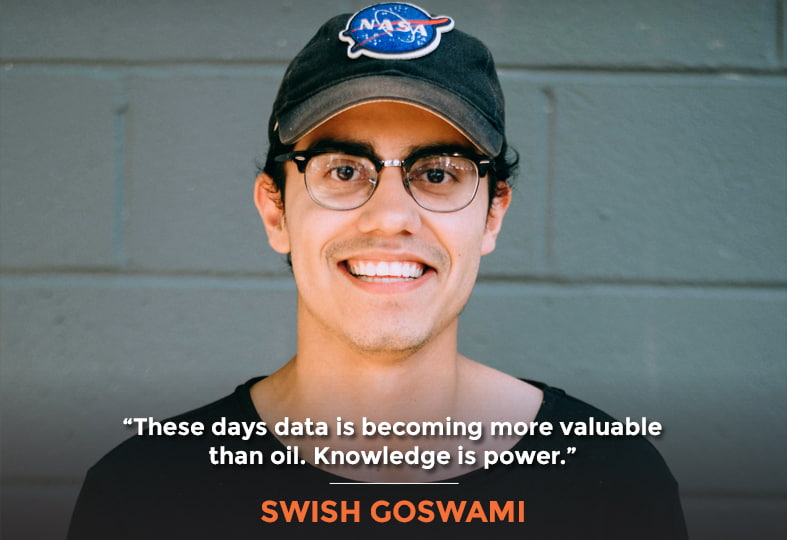
In this Episode
- [00:29] – Stephan introduces Swish Goswami, the CEO & Founder of Trufan, a LinkedIn Youth Editor, a three-time TEDx speaker, and a United Nations Youth Ambassador.
- [05:22] – Swish discusses the trend of third-party cookies going away and the consumer privacy concerns gradually rising.
- [11:52] – What are the features and capabilities of the platform Trufan?
- [15:32] – Swish shares their game plan on how to land massive clients.
- [21:16] – Swish and Stephan discuss their views about TikTok, its CPM, and conversion rates.
- [26:05] – What are some of the examples of companies doing great in community building and their strategies in doing it?
- [31:08] – Stephan and Swish describes what type of community is built in the platform Reddit.
- [35:50] – Swish tells their approach and tools that they use to find out what is trending.
- [41:03] – Swish shares a story of a magical coincidence on how he and his friend, the co-founder of Trufan, met and build the company.
- [49:00] – Follow Swish Goswami on his social media account and visit his website trufan.io, to learn more about making smarter marketing decisions
Transcript
Swish, it’s so great to have you on the show.
Thank you for having me, Stephan. I really appreciate it.
So, first of all, I’m very curious, when did you get started with your entrepreneurship journey? If you’re 23 now, were you what, 10 when you founded your first business?
Yes. I mean, I had extensive entrepreneurship I think as a kid. I don’t know if I actually even knew the word “entrepreneur” growing up really. It wasn’t something that was talked about a lot in my family. But when I was seven years old, I remember building a hovercraft with my father because he was an engineer by trade, and he wanted to teach me a little bit about engineering, designing. So building that was really cool because I was able to sell it for $200 and buy a Nintendo DS on my own merit. That was probably the best purchase I think I’ve ever made in my life.
And then later on, when I was close to high school, I joined a program called Junior Achievement. Junior Achievement is a program in Canada teaching entrepreneurship.
And in the US. I’ve been in it myself.
Cool. They’re just fantastic. We actually built a custom lapel pin company as part of the six-month program. We won Southwest Alberta’s Company of the Year. We were nominated for Canada’s Company of the Year in the program. It started to give me a little bit of a sense that, hey, maybe this is a good path for me. Maybe there’s something here. But for Trufan specifically, I started that when I was 20 years old.
These days data is becoming more valuable than oil. Knowledge is power. Share on XI dropped out of my second year of college, was working in New York, and created a huge media platform called Dunk before I started Trufan. Dunk had about 11 million followers across 21 different accounts on Instagram, Twitter, and Snapchat. Our biggest account was @dunk on Instagram. And it was through the process of really building up that audience and working with brands that I came up with the initial idea for Trufan and why it would be important for brands to be able to reward their top fans.
Wow, that is so cool. I love those from nowhere to infinity kind of stories. That’s fabulous. What would you say has been the biggest knock on your butt that you got through this process of starting a business, to figure out how to get money from investors, making acquisitions? What’s been the most painful but hopefully rewarding life lesson?
I mean, there are a few things. I think number one, I realized that though I was really good at getting an idea off the ground, I maybe wasn’t the best person when it came to managing people. I think just management of people is a totally different discipline, and it was something that I had to learn the hard way by having people either leave the company because of me and just not feeling valued.
Or even having situations where I just didn’t get the most from people because I wasn’t asking for more, and I wasn’t managing them in a way that was inspiring them to work faster and harder. That was a hard lesson but definitely, a lesson that was good for me to learn over the past three, three, and a half years really of building Trufan.
I was really good at getting an idea off the ground but I wasn’t the best person when it came to managing people.
Then the second thing that’s equally as important and just how important it is to have a pulse on where marketing, for example, is going or where your industry is going. For us at Trufan, one thing I’m very, very proud about is that three years ago, influencer marketing was at its peak, you would say. Everyone was starting to get into it. It was like the next big thing in marketing, and we capitalized on that but in a different way in terms of encouraging people not to only go after the most influential people, but ideally influential people that followed them—their influential followers, their influential fans.
In our second year, we realized that a lot of people wanted to not only look at their own top fans, but they also wanted to look at their competitor’s top fans. So we built out functionality within our product through an acquisition that was able to allow us to give basically a database of over 2.4 billion unique social profiles to brands and allow them to segment and filter, not only their audience but their competitor audiences as well.
And then in our third year, we realized that the trend—when you take a look at privacy when you take a look at Apple’s newest software update coming out in 14.5, or if you take a look at GDPR and CCPA or third-party cookies going away—seems to be away from even third-party data towards first-party data. That’s where we decided to, again, build out functionality through an acquisition around first-party data generation and helping brands really start to get into generating first-party data, becoming a database, not only third-party data for them but first-party data as well.
I think we’ve been a little bit ahead, but again, it definitely takes a strong pulse on the market in terms of talking to the right people, having the right people around you in terms of investors and advisors, just staying in the know, and talking to your customers as much as you can about what they’re seeing within their jobs.
Amazing. All right. Let’s talk about third-party cookies going away. Let’s give a little background on the situation timeline and all that sort of stuff, and then what our listeners can do to prepare and ameliorate the situation for themselves if they’re reliant on third-party cookies.
Consumer privacy concerns have been rising gradually over the last few years.
Sure. So I think consumer privacy concerns have been rising gradually over the last few years. I think the inflection point definitely was Cambridge Analytica. When Facebook got caught for basically being ignorant—
Oh my goodness, that Netflix movie was incredible.
Social Dilemma, right?
It was Social Dilemma, yes. Wow.
It was eye-opening. I was actually watching it with my mother a few weeks ago. My mom was like, “whoa, this is happening? Now I know why whenever I get a shopping ad for something that I was talking to my friends about three days ago, I’m not surprised about it anymore because it almost feels like your phone’s listening to you sometimes.”
And to think that entire governments have been put in place because of the shenanigans going on at Cambridge Analytica. I remember, what was it, Trinidad and Tobago? Their prime minister, is that what it was?
And the massacre in Burma, in Myanmar. The spread of fake news around Rohingya Muslims in Myanmar led to basically a mass exodus of those people leaving because they were scared for their life, and that was because of fake news that was spreading on Facebook about these guys having some sort of disease or infection that was going to come in and affect mainstream Burma.
So, there’s a lot of problems. But to be fair, going back to the initial point, these consumer privacy concerns continue to rise. One thing that a lot of companies now have had to face is how do we go about getting customer data but in a way that allows them to feel respected and to feel valued for the data they’re giving?

Facebook is off the mindset still given the fact that we consent to their terms of agreements and use their tools for free so that they can just take whatever data they want. You’re actually seeing this recently play out even in Apple’s iOS update. Apple decided to make sure that every single time you’re being tracked, you get the ability to give permission to the apps that are tracking you, and Facebook doesn’t like that. They were like, why would you do that? Because the number of people would just probably opt out, which most people would. If I knew I were being tracked by an app, I’d probably opt out unless there was an app that I was really, really close to.
We’re seeing this entire privacy debate happen, and one of the byproducts of that is that Safari, Firefox, and Chrome have decided to take away third-party cookies by the end of 2022. Every time you go onto a site, you’re now going to be prompted by that site to accept their cookies. First-party cookies are fine. When you accept it, it’s fine.
It’s not like cookies all together are going away, but any sort of third-party cookies, ideally where you come onto a website and it tracks you without your consent or without your permission is going to be going away entirely by the end of 2022. Pretty massive change and definitely a big change for advertisers when it comes to how they go now about advertising to audiences without their permission.
Right. If Chrome is doing this by the end of 2022, most likely, other browsers will follow ensue, right?
100%. Chrome makes up about 85.17% of browser users in terms of desktop—not mobile, but desktop. Again, Safari is already committed to this as well obviously because of Apple’s recent push towards really trying to be on the right side of history here. Firefox as well with Mozilla. It’s pretty cool.
Third-party cookies, where you come onto a website and it tracks you without your consent, is going away entirely by the end of 2022.
I mean, one thing with Trufan actually that we’re really excited about is a consumer platform we’re going to be putting out by the end of this year. I can’t speak too much about it, but that consumer platform is going to be geared towards basically allowing people to get rewarded for their web data, allowing them also to be able to see exactly what data is being tracked and to be able to manage that data to a certain extent.
That’s great. I’m keen to hear more about that when you’re ready to make an announcement. I’m actually working on a book all about data rights. Think of civil rights as it evolves to become in part data rights because we don’t normally get control over our data and how it’s used. The big corporates are using that data without compensating us and not for our better benefit, for the most part. People need to be smart about how they’re using search engines, how they’re using social media, and all the different apps. It’s a big deal.
Yes. And my big thing is I don’t think people mind sharing data. I think one of the things we actually do when we generate first-party data is we get information directly from customers for brands. Whether it’s Bud Light, GFUEL, or Electronic Arts, they want emails, they want phone numbers, they want mailing addresses, but they don’t know how to do that properly in terms of obtaining that information in both the compliant and high-quality manner. That’s where they come to us, and what we’ve deduced is that people are fine giving their data. However, they want to know that they’re getting something for it.
Previously, Google and Facebook, the claim was that we can take customer data because we provide our platforms like Google Maps and Google the search engine for free. But the balance is just so different now. Ten, 12 years ago, oil was still the most valuable resource in the world, and that’s just drastically changed now. Seven out of the top 10 most valuable companies in the world are companies that collect data. Data is definitely more valuable than oil as a resource now, and I think it’s time for us to be able to balance the scales a little bit in terms of providing value back to consumers.
We help any brand or influencer generate compliant and high-quality first-party data through giveaways.
Yes, agreed. Let’s talk about some of the capabilities of the Trufan platform because you’ve got some very innovative technology. Not that we’re going to make this a pitch or anything, but it’s really fascinating. You didn’t pitch me to be on the show, I pitched you. I contacted you because I found out about your platform and I was so impressed by it. I’m like, I got to have this guy on my show. If you could give us some behind-the-scenes around what your platform does that is really innovative.
Sure, 100% appreciate the kind words. There are three facets to our platform. Number one is first-party data generation. Essentially what we do is help any brand or influencer generate compliant and high-quality first-party data through giveaways right now. We have this amazing platform that we call Playr. Playr gets about 600,000 monthly visitors each month that is interested in giveaways and obtaining prizes.
Whether it’s working with Bud Light to create the ultimate gaming experience or working with GFUEL to give away some of their product, we set up an awesome giveaway. And our giveaway technology is proprietary because not only can we get you Instagram followers or Twitter followers, we’ve built integrations that allow you to be able to drive traffic to any growth objective you have.
Whether it’s I want more app downloads, I want more newsletter sign-ups, I want more people to watch a certain video, and we can actually make sure they watch the entire video before entering the giveaway. That’s the type of stuff that we built that’s really unique to our giveaway platform.
Past that, once we’ve generated that data, we have the second phase, which is segmentation. Our dashboard not only allows you to take your first-party data and segment and filter it but also allows you to view third-party data so data from Instagram and Twitter and segment all of that. You could find all the people that are verified who follow you on Instagram between 0 and 100,000 followers that are in Miami and have the keyword vegan in their bio. That’s how specific you can get with some of the filters that we built out on our platform.
Data is becoming the most valuable resource today. Seven out of the ten most prominent companies in the world all handle data. Share on XOkay. You know there are no coincidences, right? I’m about to move to Miami, I’m a vegan, so that’s pretty funny. In two weeks, Miami area, Hollywood, Fort Lauderdale. I just had to point that out. It’s fun. Okay, keep going.
There are a lot of people moving to Florida, I feel. I feel like it’s becoming the next hub.
I think so too. It’s a great place to be. I’m in Tel Aviv at the moment. It’s been a fun place to be, but now it’s time to move somewhere else. Florida’s it.
I’ve heard Israel during COVID has been unreal like you guys have cracked down properly and done your stuff, at least from the outside. We’ve seen parties and stuff too now. Things are going back to normal, I heard.
Well, yes. The outside view is not what’s really happening on the inside.
Fair enough.
It feels very draconian from the inside, just my personal opinion. Back to the topic at hand.
Totally. The final aspect of the product is activation. So essentially, once you have all these emails, we have a really awesome integration with Zapier that we’re actually going to be announcing hopefully in a month and a half. You’ll be able to send emails directly through a platform. You’ll be able to even import data from our platform to HubSpot or to Salesforce to be able to bring it back into your CRM.
That activation piece is something we’re still in the process of building out. Hopefully, in a month and a half two months, we’ll have that build. But everything from first-party data generation to segmentation is currently live. We’re very excited to be working with, obviously, a lot of big enterprises on that.
My long-term goal here is to help you move your audiences to places where you can engage with them at any time without paying.
Very cool. All right. How would you land the next big massive client the size of the NBA or NFL? What’s your game plan for landing the baseball league or whatever?
Yes, 100%. I mean the MLB, for example, is actually someone we’re talking to right now. I mean, the one good thing is we’re coming in with a lot of great case studies. We work with the NFL, we work with the NBA, Procter & Gamble, Netflix is a long-term client of ours. We can take some of these really big case studies and tell companies, tell leagues like the MLB, hey, here’s what the NBA is doing, here’s what the NFL is doing, and try to see if they’re interested in that.
But beyond anything else, my bottom line pitch is this, I think any brand manager today wants to grow their channels. A lot of brand managers want to grow their channels on new platforms that are popping up like Twitch, for example. When we worked with Bud Light, it wasn’t like they wanted more Instagram followers, they wanted Twitch followers. They wanted people that were following them on Instagram to also follow them on Twitch, and they designed a giveaway campaign that was perfect for that.
That’s a big thing that we can help out with is allowing you to really move your audiences, and my long-term goal here is also to help you move your audiences to places where you can engage with them at any time without paying. I feel like right now, so many brands like the NBA have 50 million followers on Instagram, which means every single time they want to engage with their audience, they have to use Instagram. They’re reliant on that platform.
The problem with the reliance is that (a) if Instagram ever goes away, you’re screwed, or (b) if Instagram changes, which they definitely have. Their engagement rates have plummeted recently. A post that you made 10 years ago might reach 5 million people, now it’s going to reach 500,000 people, you’re kind of screwed unless you pay money to Instagram to advertise to your own audience which doesn’t make sense.
When you have those emails and phone numbers, you can then engage with your audience wherever and whenever you want.
That’s why we’re really bullish about first-party data because when you have those emails when you have those phone numbers, you can then engage with your audience wherever and whenever you want. On your own terms, you can retarget them and build a relationship with them, as opposed to having to be reliant on third-party platforms.
Wow. Let’s talk a bit more about how reach has plummeted, not just on Instagram, but also on other platforms, right? Facebook I think probably led the charge with that in terms of plummeting rates so that they could get everybody to pay. It’s essentially a pay-to-play platform on Facebook and has been for some time now. Let’s talk a bit about that.
it was interesting. There’s an interview that came out from Adweek with Melissa Grady who’s the CMO of Cadillac and she had the same views. She said on Instagram and Facebook, I’m a little bit nervous because every single time we advertise, we have to essentially pay money to reach our own audience. It’s no surprise, right? Engagement rates have constantly declined like you said because Facebook’s just looking for more people to pay for ads, and that’s what they think is going to continue to drive their business.
I would actually say on a large, I guess, more philosophical debate, I think paid ads overall are actually declining dramatically when it comes to their effectiveness for big brands specifically.
Airbnb, for example, two months ago took out their entire paid marketing division. They literally just cut their performance marketing budget because they realized that throughout COVID, their search results were going up. Their results on social media like their impressions were constantly staying the same. Their purchases were increasing, and it had no correlation or no real causal link to their paid advertising efforts.
What they realized is that instead of advertising, what they need to do is focus more on community building and on trust and actually reaching out to their customers and working with the right people that can allow them to continue to stay top of mind.

I think eBay has also seen that in the past. EBay turned off their paid ads and noticed no dip in search results for SEO when it came to Google. I think it’s just worth noting that paid advertising, especially if you’re a big brand that already has brand awareness like people already know what you do generally, there’s a really strong diminishing marginal return there that you have to be aware of if you’re a brand manager.
Yes. If you’re a small business owner or a marketer for a small business, what would you say is a platform that still gives a lot of free reach without any strings attached?
LinkedIn for sure. I’ve run my personal brand on LinkedIn for the last four or five years, and I’ve noticed that LinkedIn continues to have really good organic reach. I don’t know why, I don’t know what they’re doing with their algorithm compared to Facebook, but it just seems like LinkedIn isn’t trying to drive people to advertise.
They’re very clear that for individuals, for small businesses, you can still build up your company page, you can build up your individual page. As long as you post consistently, you tag the right people, you get a certain amount of comments within the first hour or two, you can go viral. There’s been a number of people that I’ve literally told them about LinkedIn, they’ve tried it out for a few months, and they’ve had one or two viral posts that have reached 50,000, 100,000 people, and they’re just being shocked by it. Where did this come from?
I think LinkedIn is still a great place to play. Past that I can’t think of anything else. I’m not a fan of Snapchat. Twitter is cool, I just don’t know how to use Twitter really. I think you have to be a certain breed, in my opinion, to figure out the Twitter algorithm and to be able to really figure out how to even build a community on Twitter.
Staying active seems to be the number one ingredient for setting yourself up for growth on social.
Wherever you choose though, daily updates are very important. Regardless of whatever platform you choose, I think platforms are encouraging people to post daily by giving them more views and by blasting their content across people’s profiles more. I think staying active seems to be the number one ingredient for setting yourself up for growth on social.
What’s your view on TikTok?
Not on it. I obviously know that my entire generation seems to be on it, gen Z is very much on it. I would say with TikTok, I’ve heard that CPMs are very, very low, but that’s also because conversion rates are low too on TikTok. This is from one of my friends, Nik Sharma, who is an ecommerce marketeer, he’s worked with a lot of big brands.
He just has found that TikTok is appealing, obviously, because a lot of brands want to reach that particular audience and they’re literally just all there for the taking. But the platform itself, their ads manager, they haven’t figured it out too well yet. But thankfully, it doesn’t cost high. It’s not like LinkedIn where I actually do feel like LinkedIn CPMs are high and their effectiveness is also low. Thankfully for TikTok, both are low, so it’s fine just testing it out to see if it works. But I think TikTok, again, goes back to just organic content will probably allow you to do well.
There’s a company called Flighthouse actually out of LA. They’ve done a phenomenal job over the last two years of just putting out organic content on TikTok, reposting viral content, putting a new caption and tagging the original owner, and just aggregating the most viral content on TikTok and sharing it that way. Now they’re getting into original content with some really cool creators.
There’s a number of things you can definitely do on TikTok that I think worked also on Instagram during the early days.
What do you think of YouTube as a social media platform? I mean, it is the number two search engine, of course, and it is a social platform because people are favoriting, liking, and there are live streams—all the sort of typical things you see on a social media platform. But for some reason, people tend to not think of YouTube as a social platform.
Yes. I think it’s because we’re so accustomed to seeing a feed. Every platform has stories now. I mean, YouTube has stories now too to be fair. I guess we’re so accustomed to just seeing a feed where we can share a post very easily. You can share a tweet, you can share a Facebook post, you can share an Instagram post.
The average person going on YouTube is like, I want to watch videos, not I’m going to post a video.
This might be a total lie but I just think the average user going on YouTube doesn’t think I’m going to post a video. I just think that’s the psychology. The average person going on YouTube is like, I want to watch videos, not I’m going to post a video.
Yes. They’re consumers, not producers or creators.
Exactly. I do think YouTube is cool though because we’re seeing this battle between YouTube and Twitch around compensation for creators and which model seems to work better for them. Some people I know still actually like YouTube’s algorithm. They like the way that YouTube allows for small creators to be discovered.
They also like the ability to just make money off ads versus other people love being able to build up a big audience and have each person pay $5 to them and not have to have ads or anything like that overarching their videos. Which gives them also autonomy over what they post because they don’t have a fear of being demonetized either.
I think you’re seeing this really cool debate play out. I think both platforms are incredibly effective. I do think Twitch though is the future, and I think a lot of people still think that Twitch is just for gaming, which it definitely isn’t. Twitch is definitely more than just gaming content now. It’s become very far-reaching.
So Twitch is the future, please elaborate.
I mean, (a) I think compensation for creators, the ads model like I said, going back to why else I think paid ads are useless. I don’t think ads will be around in the future. I think it’s in 10, 15, 20 years we’re going to figure out a new way to advertise, but it’s not going to be done in this way that’s intrusive, that interrupts people’s day, that makes them watch stuff they never wanted to watch in the first place.
Businesses today need to be more respectful when it comes to getting customer data. They owe it to their audience to be truthful and honest about what they’re getting from them. Share on XYou sound a lot like Seth Godin right now.
Yes, but I’m just saying, it just doesn’t make sense. Why did we even come to this point? I guess maybe this is the first phase of the internet, but we’re going now into the second phase, and I think we’re very rapidly going to get into the third phase after. The second phase is around asking for permission from people and the third being actually compensation for consumers.
But I just genuinely think Twitch has figured out a great compensation strategy. The people that stream on Twitch—from what I’ve seen, at least—seem to be exclusively doing their content on Twitch. They’re not all over the place. It’s not like they’re only doing YouTube, but they’re also putting on music, and they’re doing stuff on Instagram and TikTok.
The people on Twitch that I’ve seen like the Alexandra Botez of the world who post even chess videos are only streaming on Twitch because they love what they do, there’s a great way to make money on Twitch that doesn’t require them to be on every other platform and having to make money in four or five different ways.
I generally think, between brand deals and making money on Twitch, creators are more likely to flock towards that model. I generally do think that the audience, again, of Twitch is fairly young. Give it 5, 10 years and you’re going to obviously see those people grow up, become mainstream consumers buying things, and that’s where more brands are going to be spending money on Twitch too to be able to reach that audience.
I just genuinely think Twitch has figured out a great compensation strategy.
Yes, it should be interesting. All right. Let’s talk about community building, and I know you gave Airbnb as an example of a company that’s really doubling down on that. Please elaborate on what the future is in community building, what are the best practices? Airbnb and whoever else that’s really doing a great job with it, what are they doing?
There’s obviously the element of trust which is so important, right? We’re inundated with so many different options now for every category. Even for Airbnb, there are so many competitors that have popped up for Airbnb across various places. Depending on where you live, there’s an Airbnb I feel in that country now.
It’s just worth noting the reason you’re going to pick Airbnb because they have set a standard. They’ve set a standard, they’ve communicated it on social media, they’ve been patient with you, they’ve been kind with you, they’ve given you content that maybe inspires you, makes you think about a vacation, makes you think about what it would feel like to be in that location.
I think trust, number one, is probably the most important thing, and Airbnb I think has done a great job of doing that. Even now, if I ever have issues with customer service, I can literally tweet them and I’ll get a response back by the end of the day. They’re just that responsive, and it’s great to see that.
The second would be I think a lot of consumers want the brands they follow to talk to them like an individual. You’re seeing that with Burger King, for example, on Twitter. They’re savage, they roast people. They act like they’re an individual page versus a corporate page.
People are picking Airbnb because they have set a standard.
You see that with the Mercedes Formula One team. On their Instagram page, they share memes and they ask people to caption the memes. Then they actually go into the comments and respond to people directly thanking them, making fun of them, giving them a joke that they go and screenshot and then those people reshare it.
I think being an individual as a corporate brand and not taking yourself too seriously is a great way to produce viral content because it’s just so different. When you see a KFC that’s been a long-time corporate brand, their CEO, their corporate executives, they’re all fairly older people that generally, when they do interviews, don’t feel like they have a sense of humor. But then you see them on social media and they have this totally different brand of youthful, young, passionate, energetic, and humorous. I think it’s just really cool to be able to see stuff like that.
I think those two elements are really important—not taking yourself too seriously as a brand, and really focusing on community building through interacting with trends, being a part of those trends. And then secondly, I think trying to foster trust by being as responsive as you can on social media while also being very patient and leading with empathy. I think those are some of the key things to keep in mind if you’re a brand manager.
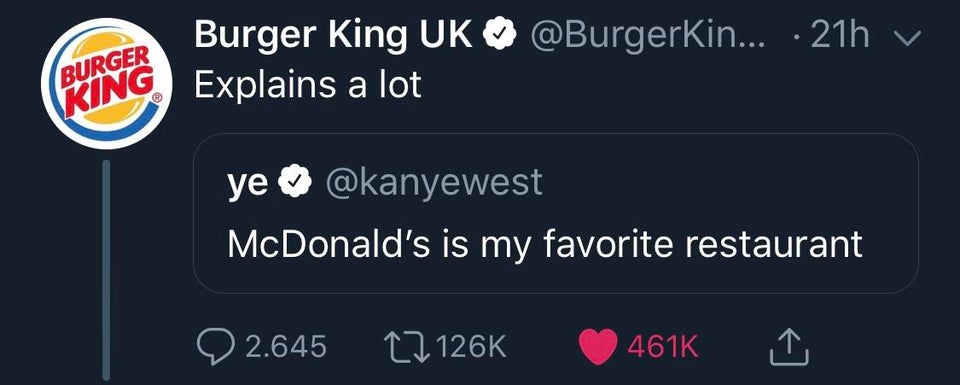
Leading with empathy. I like that. I got to get an example o r two of brands like Burger King roasting other brands. One example that comes to mind—I actually had to Google it for the exact thing. It’s really funny though. Burger King UK, in response to Kanye West’s tweet saying “McDonald’s is my favorite restaurant,” their response, “Explains a lot.” That’s awesome. Do you have any examples of any of these kinds of roasts?
I have a lot from the Mercedes team because I’m a big Formula One fan. It’s funny because there’s a driver in Formula One, Kimi Räikkönen, and Kimi Räikkönen is known to be short-tempered. In a Formula One car, when you’re driving, you obviously have 60, 70 laps. You don’t get off your car ever and go and take a leak or even drink water. They have something called a drink, which is basically a pipe that’s connected to their mouth and they can drink it whenever they need water.

Kimi in this one video was like, “Hey, guys do I have my drink on?” They were like, “No,” it’s an Italian team called Alfa Romeo and they were like, “No, no, Kimi, you will not have the drink, you will not have the drink. You do not have the drink.” Kimi just gets so angry about this.
The Mercedes team, for probably the next year, kept posting any photo of Lewis Hamilton—the Mercedes driver—took with Kimi Räikkönen. They’d constantly continue to allude to that, did Kimi get the drink? Do you think Kimi got the drink? And asked people to comment, encouraged them to comment. Just funny statements that Kimi’s made in the past, whether it’s that statement or other statements he’s made in the news.
I just love that type of stuff, and the common line between all of them is that they play into the culture. They play into popular news. Kanye West is a popular figure that is a part of the culture. We talk about him pretty much on a weekly basis. Formula One, in terms of this meme that came about, was shared all over the place, “No Kimi, you will not have the drink.” That became a meme that now Mercedes is able to play into.
Finding these moments of culture, I feel, is really putting your brand if it makes sense. Not pushing it because I know you can be called out also for being corny and it can really backfire. But being careful about how you really intertwine your brand and values to that point of culture, I think that could be a really cool entry point for a lot of brands to be able to start engaging with younger people that are really interested in this type of stuff.

Yes, it seems like a place, a community that would be receptive to this kind of fun, poking fun at yourself, your brand, competitors, and so forth would be Reddit. It’s also a very dangerous place to play if you’re a marketer because they will come out with their pitchforks. What’s your view on Reddit?
I like Reddit. I think I’ve always told people this. The memes, for example. Memes are probably the best thing you could post on Instagram. People love seeing these. Some of the biggest pages on Instagram not run by celebrities but just generically just pages tend to be meme pages. I’ve always said that the funniest content on the internet normally always starts on Reddit. It’s normally always either a comment on Reddit or it’s someone posting a meme on Reddit that then two, three weeks later gets picked up on Instagram and Facebook by these bigger pages.
I think Reddit’s awesome. Again, as you said though, I find that it’s tough to advertise on it because the community there can be quite unforgiving, and it’s a little bit hard unless you have someone really good at moderation. If I was ever looking at Reddit as a platform that I was looking to grow my brand on, the first person I would hire is a community moderator or just a community manager in general because you really want to make sure that you’re proliferating the discussion that happens around your brand on Reddit. It can go very much south very quickly I feel.
What does a community manager’s job look like, and how would somebody, a listener who thinks they need a community manager hire that person?
I think community managers now are a little bit more dynamic. I think in the past they were literally just people that schedule posts, respond to comments, and get back to DMs. But I think now you’re starting to see a community manager do two things. One is outreach for sure still, so scheduling posts, responding to comments, responding to DMs—that’s still one function, which is very much around outreach.
But I think the second is around trying to think about what can we possibly do with our followers to get them to engage in our content? And that’s very much fed into the creative process as well. What is the type of content we should put out that can really drive the community to comment? What is the type of even virtual event that we could set up that allows for our audience to be able to meet us and to be able to engage with our brand in a more direct way?

You’re starting to see a community manager go from just being a communicator, an outreach master, a messenger (if you will), to really being like the facilitator of conversation. Somebody that’s setting it up for people to be able to engage.
Okay. Are these community managers just hanging out on Craigslist waiting for job offers or something? What’s the process to recruit somebody like this?
It’s not the most technical job, right? We’re hiring community management right now for Trufan. We’re not looking for people that have like 10 years of social media experience. We’re just looking for people that are hungry to learn, but the number one thing is that they love to talk. They love to talk and they love to read because we want people that understand okay what is trending in culture today? Across sports, across fashion, across entertainment, across humor, across lifestyle, what is trending?
I want people that are cognizant of that because if something really big happens and the world is talking about it, I want my brand to be able to talk about it too, or at least to be able to think about how we can intertwine our brand with that moment of culture. That’s really the requirement.
It’s not like you need an intense amount of experience, which is why I feel like community managers tend to be a lot younger now too. You’re seeing literally 22-, 23-, 24-year-olds get hired into big corporate companies to be a community manager or to be a brand manager because these corporations want to stay ahead of the curve. They want to advertise to a younger demographic, but they don’t understand what the hell these guys are watching, reading, or who they’re following.
Are you using a platform like Acadium to find your community manager interns and other types of interns or some other platform?
No. I mean, we get a lot of inbound, which is nice so we do get quite a lot of people over the summer reaching out and saying, hey, do you guys have internships? And we normally do have internships across marketing, sales, and CS (customer success) mainly. And then two, we’ve actually worked with an organization called CareerUp.
CareerUp is cool because they actually offer tuition credit to students. You essentially can get away really with paying a nominal rate to interns and not having to pay them a full-time salary or part-time salary because they are compensated through student tuition credit that they’re able to use towards graduating. CareerUp is a great program. I know they started maybe a year or two ago, and we’ve had a really good relationship with them.
People technically are more than willing to share their data, but they also need to know what they're getting in return for it. Share on XOh cool. How do you figure out what is trending? I know that, for example, you can check on Twitter, there’s a little thing on the side that says these are trending hashtags. You can use a tool like BuzzSumo. You can use SparkToro and see what the popular hashtags are for your competitors’ audiences and so forth. What are the tools and approaches that you find the potential community managers are using to figure out what’s trending?
I’m maybe a little bit more manual and maybe a little bit more traditional here, but I don’t find any tools too appealing. What I find more appealing is following the right people. I try to look at who’s ahead when it comes to these trends? Who normally capitalizes on these trends a lot?
For example, there’s a YouTuber, his name is Logan Paul. Some people might know him as that person that was infamous like three or four years ago. He did a huge blunder as a PR nightmare really for any YouTuber, but then he bounced back. He had a really good career, he put out a great podcast called Impulsive, and he’s ahead now on the Crypto and NFT side. He’s been boxing as well. He might be fighting Floyd Mayweather soon apparently, which would be insane.
That’s someone that I’d be like, “Yeah, follow him because if something is trending in the world, he’s going to talk about it either on his podcast, or he’s going to talk about it in terms of some of the ways that he even works.” He’s going to release an NFT before everyone else does because his team is just so forward-minded.
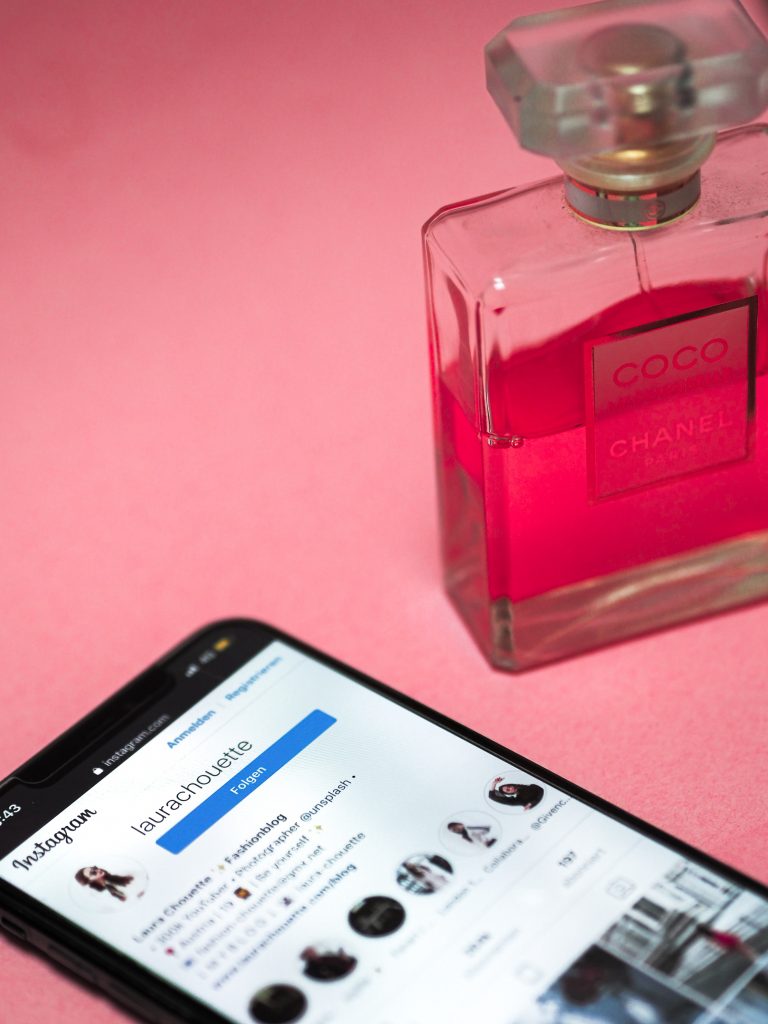
I like to follow certain people that I think allow me to kind of understand where things are going. Elon Musk on Twitter is always fun, so he can be a little bit crazy at times. But the type of person that would talk about stuff that’s trending, and again he’s also a point of culture. When he says something, people listen. And sometimes, whatever he says becomes a moment of culture. Following either directly the source or the messengers of those sources is always great.
Yes, that’s great. Great advice. Since you mentioned NFTs, we got to explain it to our audience here. First of all, I highly suggest our listener go check out the Saturday Night Live skit, “What the hell’s an NFT?” Because that is amazing. Have you seen that?
I haven’t, though.
Oh wow, it is hilarious. It’s an Eminem parody, a rap about what an NFT is. You’re going to have to watch it multiple times. There are many layers to it. It’s incredible, hilarious, and awesome. What is an NFT, non-fungible token? What does it mean for the layperson, and why should they care?
Sure. The way I break it down is to think about digital assets. Let’s talk about digital assets whether it’s digital art, whether it’s a music file, whether it’s a video, a photo, whatever it is—a digital asset.
Previously in the world, when you were to share it around, you weren’t able to monetize it. You would share that clip, people would download it, and unless you build a paywall, you wouldn’t be paid for that piece of content. It’s also worth noting that many people could just also steal that content, reshare it, and people could take a screenshot of your art and say it was their art. There was no way to verify whether you know this was the original or not.
Now, with blockchain, there’s the ability to do a couple of things. Number one is you have the ability to verify whether this is the original source, whether this is the place where this art was created because you can tag every piece of content back to its original creator.
The second thing you can do is that you can share digital art very easily across the internet. If someone in Malaysia could buy your art, and even if they don’t have USD it’s fine because they can pay through Ethereum. They can buy your art using some of the tools online like MetaMask that is a wallet that allows you to share crypto back and forth.

The most fundamental way to think about NFTs, I would think about it like a concert ticket. On a concert ticket, you have the name of the event, you have your name, and you have the date of the event and where you’re sitting. It is personalized info which means that no one else except for you can enter that festival or enter that concert because it directly traces back to you. That’s essentially what an NFT is in the way that you want to think about how it verifies back to one source, it’s similar to a concert ticket in that way.
We’re seeing this kind of NFT boom now where people are sharing an NFT, whether it’s a music file, or whether it’s art. Mainly art, I think, or even if it’s a collectible. We’re seeing NBA top shot where you can buy a moment of NBA history and you can resell it on a secondary market and make even more money because you actually own it once you’ve bought it.
This is an investment opportunity too. Instead of investing in bitcoin, you can invest in NFTs, and perhaps the upside potential is much larger even.
100%. Definitely, that’s been an opportunity.
Cool. I’ll have to look into that. Now let’s go completely in a different direction and let’s talk about intuition. Clearly, you have business acumen, you have common sense, street smarts, and a lot of just drive, hustle, and there’s a place for intuition too to grow a very successful business. I’m curious to hear what are your most magical coincidences, intuitive moments in the trajectory of your business?
I think two things come to mind. One is reconnecting with my co-founder Aanikh. I actually met my co-founder Aanikh when I was 17, he was 16. We had both won an award, Canada’s Top 20 Under 20. I had won it mainly for debating. I debated for the National Team in high school, and he had created an app. He created a ringtone that only people under the age of 21 could hear. He went on Dragon’s Den, he pitched the platform, and he actually got venture capital funding at the age of 16 from a woman named Arlene Dickinson.
It was really cool to be able to meet him at the event. He was actually my roommate at the event too and we became really, really good friends over the course of a week of that event because it was not just an award ceremony, there were a bunch of training workshops, et cetera.
It was by coincidence, I guess, but I was coming from New York. Now, fast forward, I’m 20 years old. We’re coming back from New York and I’m speaking at an event in Vancouver. Aanikh, my co-founder, is from Vancouver but he was in the second year of Stanford. I guess, for some reason, he was back home and his house got flooded. It turns out he was staying at the same hotel that I was speaking at, the Fairmont Royal Pacific.
Data rights are evolving. People now have more ability to control their data. Share on XIt was just so cool because I ran into him in the hotel lobby, and I’m like, “Hey, long time no chat. It’s been three, four years now.” We had a great catch-up call after and then we met in San Francisco when I came for business for Dunk, the company that I worked on before Trufan.
When I came up with the original idea for Trufan, he was my first phone call. I asked him, “Hey, I know you’re studying computer science and engineering at Stanford, would you be interested in coming on and helping build this with me?” He was very interested. He eventually, obviously, took a gap year after the second year, which eventually turned into an extended leave of absence, and we’ve been working on Trufan full-time ever since.
But that’s one moment that I just think is what a coincidence that I even ran into him in that hotel lobby and his house got flooded in Vancouver. It’s crazy how the stars can align there.
Yes. Whenever you hear yourself saying, “what are the odds?” or “that’s crazy,” that’s divine intervention, just saying.
I very much agree, it had to be something there. But the second thing that also pops up in my head is COVID. I was very scared. When COVID broke out, I was starting to think, would we survive as a business? Would we have to lay people off? Would people be safe? Would they be healthy? Would they feel motivated to work virtually?
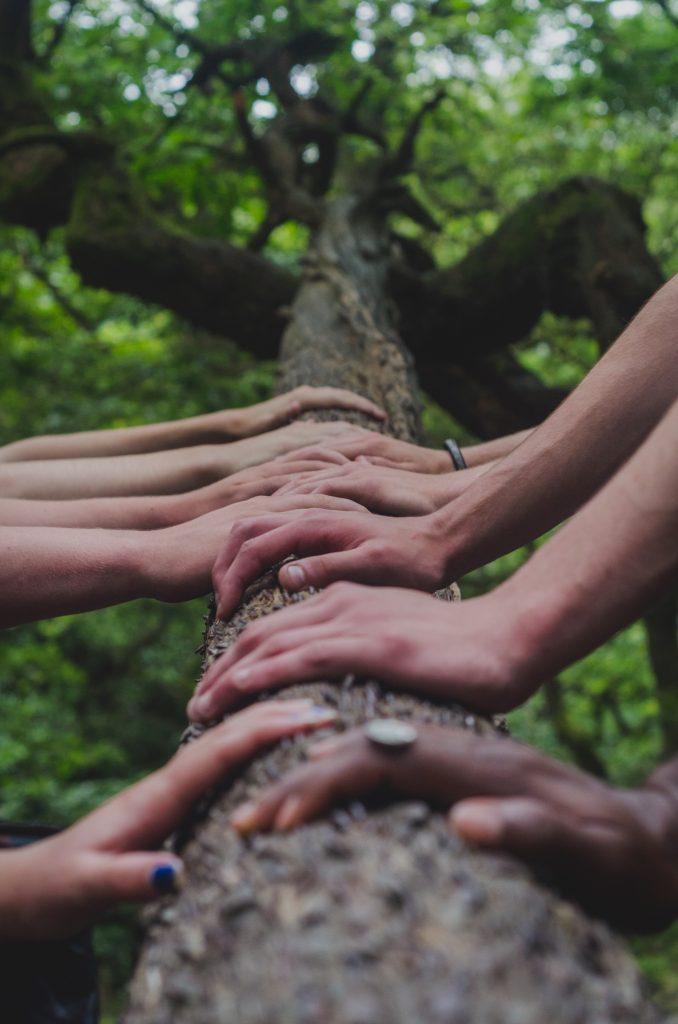
I realized there was a silver lining. The silver lining was two things. One, as a business, we didn’t need an office anymore so we were able to save on costs. Especially in Toronto, an office space can definitely be expensive. It also meant that a lot of businesses, retailers, restaurants that weren’t able to get people into their stores anymore were now coming online.
What you want to do when you get online is you want to find your tribe, you want to find your community, you want to find your top fans. We actually saw a business spike after COVID because a number of people were interested in digital tools like ours to reach out to their community.
The second thing we also noticed is that a lot of our employees actually liked working virtually. They didn’t like getting up at eight in the morning and going to the office. They actually liked being able to work a little bit more on their own schedule, work in their own environment, wear pajamas and take calls. They just liked working virtually and working remotely.
That was really cool to be able to even see that there’s a whole new way of working that I just wasn’t open to before because I didn’t think it was right. I didn’t think people could actually build a successful company working virtually or remotely, and now the entire world has to do it and we have this great opportunity to do it well.
We’ve actually decided, even post COVID, to continue working virtually. We’ll likely have a sales office in Toronto come up next year, but past that, our whole development team is going to be working virtually and our marketing team is also going to be working remotely.
Congrats, that’s really cool. Since we’re on the topic of coincidences and divine interventions, I’m curious if you’re familiar with Dr. Amit Goswami? Do you know who that is?
I’m not, no.
I interviewed him on my other show on Get Yourself Optimized, which is a biohacking and spirituality podcast and this guy is amazing. He was in the movie, What the Bleep Do We Know!? Do you know that movie?
No.
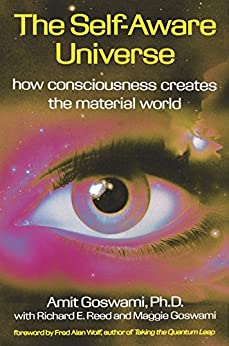
Okay. That’s a good movie to check out, a documentary. This guy, he’s much older. I forget exactly how old, but he’s elderly but he is just whip-smart, he is just so spiritual, but he’s also a quantum physicist. He wrote about things like the God particle, and one of his biggest books was called The Self-Aware Universe. He’s an amazing guy. You should check him out. Listeners, go check out episode number 151 of Get Yourself Optimized. I highly, highly recommend checking that episode out.
Now, you had mentioned that the pandemic had a silver lining for you. What was the intuition or the intuitive moment that allowed you to turn lemons into lemonade essentially?
Well, number one, we realized that enterprises were slowing down in terms of purchasing new technology. A lot of our points of contact were getting laid off, being moved, or they didn’t actually know how much they had in their marketing budget anymore. The enterprise sales cycle became much longer, which meant what are we going to do? Well, we’re going to focus now on small businesses because small businesses retailers, restaurants, they’re out of business, they’re looking for digital tools, they’re looking to come back online and try to drive Uber Eats sales, Doordash sales, or get people to their online stores for retail.
What did this look like? You called a team meeting, an all-hands meeting. I have this feeling that we’re going to need to pivot very quickly, and here’s what I think is our new market. Let’s brainstorm ways to reach them, get their attention, get their interest, and close them quickly. Something like that?
We went on a lockdown on March 21st and on April 2nd I called an all-hands, we got on the all hands. I told them, look, I think we need to push them deeper into some SMBs. And we always wanted that. It was always on a road map to eventually go after SMBs, but we just decided to accelerate that process.
We took our product and skinned it down, made it simpler, easier to use. We added interactive guides and tutorials on it. We changed the whole pricing model, made it affordable. We put out a knowledge hub with a bunch of articles and videos of do’s and don’ts and testimonials as well. Revamped our entire website and also put out a free plan. We did a lot within that April month to be able to set us up from May and onwards wherefrom May onwards we put out these plans and it very much became a big hit.
Within the first three months, we got over 500 customers. Right now I think over 750 customers. It’s just been great to be able to see that type of growth. I think one of the things we did obviously have to work on is retention because small business is easy to get but also easy to lose, so you very much want to be able to fix that bucket and make sure that nothing flowed down.
Got you. I know we’re coming close to time here. Do you have a couple of more minutes to do one last question and then we wrap up or do you have to run?
I do have to run. I’m really sorry.
No problem. Where do we send our listeners to sign up for Trufan, to learn more, to follow you, and all that sort of good stuff?
Cool. If you’re interested in Trufan, check out trufan.io. If you’re interested in reaching out and just saying hey to me, LinkedIn would be the best place to find me, Swish Goswami. Feel free to drop me a message. I check my inbox every day, so I’ll make sure to respond.
Awesome. Well, thank you so much, Swish. This was awesome and inspiring. You’re inspiring, and thank you for sharing. It was fun.
Thank you for having me. This was fantastic. I really, really loved it.
Okay, awesome.
Important Links
- Swish Goswami
- LinkedIn – Swish Goswami
- Twitter – Swish Goswami
- Trufan
- Twitter – Trufan
- Instagram – Trufan
- LinkedIn – Trufan
- The Self-Aware Universe
- Dr. Amit Goswami – GYO previous episode
- Aanikh Kler
- Arlene Dickinson
- Dr. Amit Goswami
- Elon Musk
- Eminem
- Floyd Mayweather
- Kanye West
- Kimi Räikkönen
- Lewis Hamilton
- Logan Paul
- Melissa Grady
- Nik Sharma
- Acadium
- Adweek
- BuzzSumo
- CareerUp
- Dunk Media
- Flighthouse
- HubSpot
- MetaMask
- Playr
- Salesforce
- SparkToro
- Zapier
- Alfa Romeo
- Get Yourself Optimized
- Impulsive
- Junior Achievement
- The Social Dilemma
- What the Bleep Do We Know!?
- What the hell’s an NFT? – SNL Skit
- Influential Fans
- Burger King UK roasts McDonald’s
Your Checklist of Actions to Take










About Swish Goswami
 Swish Goswami, 23, is the CEO of Trufan, a social intelligence platform that helps brands of all sizes make smarter marketing decisions using data. His company has made two acquisitions, raised over $4.1M to date (from several NBA players and venture firms), and has clients like Samsung, Netflix, NBA, NFL, PUMA, and a plethora of small to medium-sized businesses.
Swish Goswami, 23, is the CEO of Trufan, a social intelligence platform that helps brands of all sizes make smarter marketing decisions using data. His company has made two acquisitions, raised over $4.1M to date (from several NBA players and venture firms), and has clients like Samsung, Netflix, NBA, NFL, PUMA, and a plethora of small to medium-sized businesses.







Leave a Reply